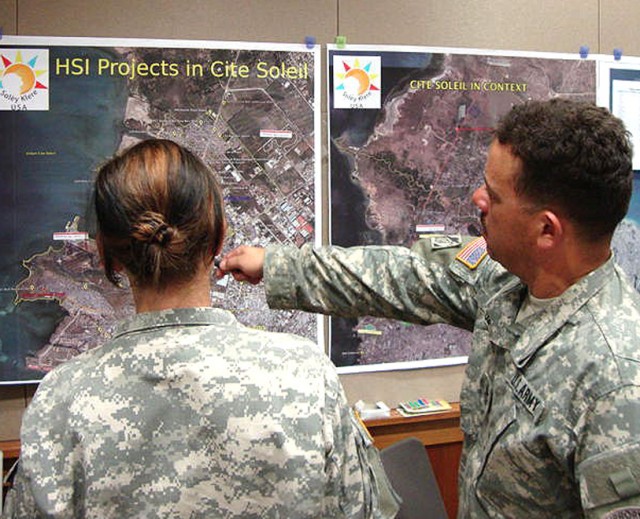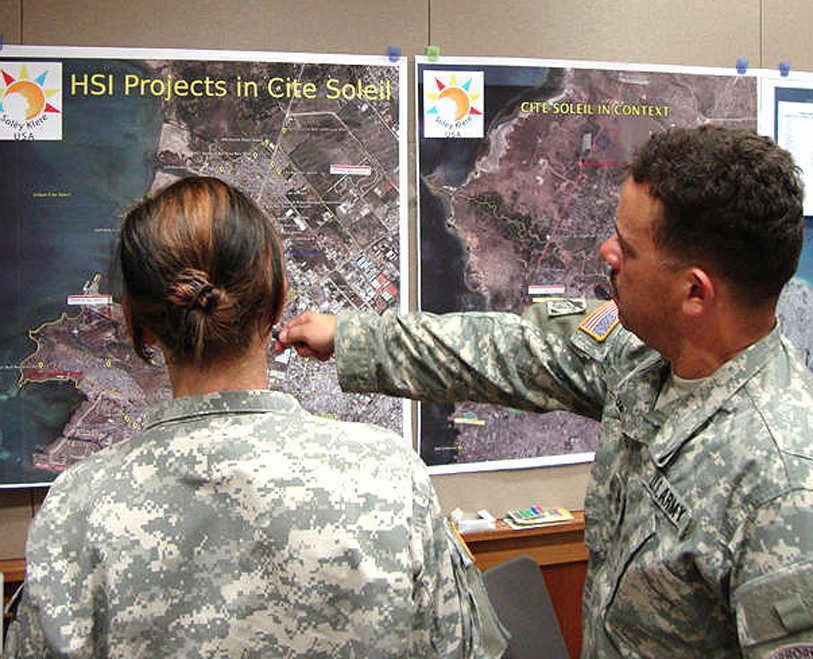FORT BRAGG, N.C. - The massive earthquake that devastated Haiti Jan. 12 left death, destruction and a country in ruins. The disaster also caused many military and civilian agencies to respond to the needs of the Haitian people. Taking part in the effort were 11 U.S. Army engineers from Fort Bragg's 20th Engineer Brigade, who supported the humanitarian effort in several different ways.
Among the U.S. Army engineer joint task force were Sgts. 1st Class Anas Malkawi, Carolina Castle and Hector A. Cruz, who brought several skill sets to assist in rebuilding the battered country's infrastructure.
Malkawi and Castle deployed to Haiti Jan. 19, just before Cruz and the rest of the brigade element came. The brigade's main body was delayed because bad weather caused a conflict in scheduling flights to the country.
The Soldiers said they were shocked at the conditions in the country, especially after seeing them on TV, then actually traveling to Port -au-Prince, Haiti.
"It was a very shocking experience because what you see on TV doesn't even measure up to what you see in person," said Cruz. "Once you get down there and see the chaos and destruction that we saw, it's unbelievable."
Castle agreed.
"We all wanted to go," she said. "It was a disaster, and our hearts were broken. Just seeing, smelling and being there, we were ready to go. When I got word that we were going, I was like, 'What's taking so long' Let's just go, they need help now.'"
The Soldiers said that despite leaving North Carolina in the midst of a cold snap, the warmer temperatures in Haiti had no adverse effect on them, as they remained focused on their mission.
"It wasn't like the summer time, when it's blazing hot," Malkawi said. "It was kind of decent weather; it wasn't really scorching or anything like that.
"I knew what to expect because I'm from Puerto Rico," explained Cruz. "The weather is similar in those two places. But regardless of that, the weather we've had here this winter, in comparison to going over there and facing a little heat, was nothing."
Malkawi said images of Haiti still haunt him, despite being back at Fort Bragg for close to a month.
"What stays with me is seeing so many people still looking for help," he explained. "Just seeing so many kids and wondering how many of those kids are actually without a mother or father. Seeing the people who need help, seeing the piles of trash and bodies being pulled out of ditches is what stays with you.
"I remember seeing people in certain areas pointing and saying, 'There are some bodies there, but they just couldn't get to them.' Also, just knowing that there's a crazy amount of work that has to be done and knowing that there's a limited amount of resources and personnel to actually do the work is what I remember," Malkawi added.
He said even when resources arrived to the island, officials had to prioritize which buildings they would clear first. He explained that JTF-Engineer included both civil and infrastructural engineers. The structural engineers were sent there to assess and determine how easy it was to remove the ruble left by the earthquake. Malkawi is a technical engineer; and he was responsible for designs, surveys and drainage assessments for new facilities. These facilities included hospitals and basing for Soldiers who assisted in the recovery efforts.
"We had about 10,000 Soldiers in the country, and you have to house them and give them land and resources. We had to find facilities for that," he said. "There are internally displaced people, which we had to find camps or new hospitals. We worked out a lot of the basing for those individuals."
Castle said the Soldiers had an idea why they were selected to travel to Haiti, but they didn't really know what to expect, despite seeing news reports.
"When we got there, we knew that we were going to jump off that plane and run (to provide assistance), doing whatever we could do," said Castle, who specializes in bridge construction. "From a human perspective, it was kind of scary. Within in one hour of our arrival, we had another earthquake."
She said the entire experience was humbling to her and many of the other Soldiers.
"Sometimes I wake up in the middle of the night and think, 'How can I even whine about my pillow not being soft or not having ice in my glass,'" Castle said. "I can't even imagine being there and having to sleep under the stars because your home has been destroyed. I still think about it and say, 'God, we are so blessed.'"
She pointed out that despite their jobs, it was hard not being affected by what they saw in the tiny country.
"Although they told us that we couldn't give our food away, if you see a child that's hungry, you can't help but to feed them and give water to them or every now and then, give them a hug," said Castle, who was sent to Haiti to assess bridges, routes and roads throughout the Port-au-Prince. "Maybe I didn't set my priorities, but my heart was there."
Cruz is a construction engineer. He said once he arrived in Haiti, he and other structural specialists went out and assessed the structures that were damaged to see if the buildings were still usable or if they had to cordon the area to keep others safe.
"I did it with pride, knowing that I was contributing in assisting the people who were in need, which gave us a lot of satisfaction knowing that our contribution made an impact," he said.
Cruz and the others agreed that the biggest challenge they faced upon arrival was housing.
"Eventually we got there. There was initially an issue with flights being able to get in there," Malkawi said.
"That's why we had to scatter our departures and were unable to take the amount of people and equipment that we wanted. As soon as we got there, the issue was fixed. The embassy was only equipped to handle embassy employees, and now you have thousands of people trying to work out of this facility.
"Once the embassy determined that it had to resume normal operations, it kind of pushed us out, so we had to, literally, set up outside the embassy," Cruz said. "Trying to set up shop is kind of difficult, but eventually we got there. We were sleeping outside for the entire time we were there. We had very limited resources."
The group of Soldiers who traveled with the 20th Engineers did not physically assist in the recovery efforts, which resulted in many citizens being pulled from the rubble, but JTF-Engineers did have a team, he Corps of Engineers Urban Search and Rescue Team, which specifically carried out these duties.
"Some of those guys actually participated in the recovery efforts at the World Trade Center on Sept. 11, 2001. They were actually there, and now they were part of our task force in Haiti," said Cruz.
"It was an honor for us to go down there and assist," Malkawi said. "We do a lot in the Army, and sometimes we don't see the fruits of the actual work that we do because it's not right in front of us, but doing something and seeing exactly how it's affecting the people who are there, feels good. We feel good about the work. Even though today it may not be making a difference, but maybe tomorrow or even five years from now, someone is going to live better because of the work that we did."
Cruz agreed and added additional insight.
"Not only that, but I think it projects a positive image to the world that for the last almost 10 years, we've been in combat, but here's this other thing that we do," said Cruz.
"We've made a great impact on it, and the Soldiers enjoy doing that because we have those values that we live by."


Social Sharing